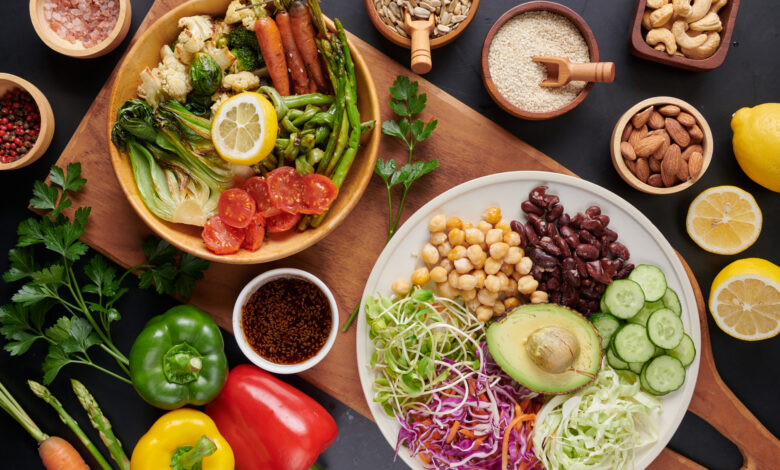
I. Introduction
- A. Importance of Healthy Eating
- B. Connection between Diet and Fitness
II. Leafy Greens for Vitality
- A. Spinach: A Powerhouse of Nutrients
- B. Kale: Boosting Immunity and Energy
III. Lean Proteins for Muscle Health
- A. Grilled Chicken: Packed with Protein
- B. Salmon: Omega-3 Fatty Acids for Joint Health
IV. Whole Grains for Sustained Energy
- A. Quinoa: A Complete Protein Source
- B. Oats: Fiber-Rich and Heart-Healthy
V. Colorful Fruits for Antioxidants
- A. Berries: Nature’s Antioxidant Bombs
- B. Oranges: Vitamin C for Immune Support
VI. Nuts and Seeds for Essential Nutrients
- A. Almonds: Rich in Vitamin E and Magnesium
- B. Chia Seeds: Omega-3 Fatty Acids for Brain Health
VII. Dairy for Bone Strength
- A. Greek Yogurt: Protein and Probiotics
- B. Cheese: Calcium for Healthy Bones
VIII. Healthy Fats for Overall Well-being
- A. Avocado: Monounsaturated Fats for Heart Health
- B. Olive Oil: The Mediterranean Secret
IX. Hydration for Optimal Functioning
- A. Importance of Water in Fitness
- B. Herbal Teas: Hydration with Added Benefits
X. Balanced Diet for Weight Management
- A. Portion Control
- B. Importance of Balanced Meals
XI. Preparing Nutrient-Rich Meals
- A. Quick and Easy Recipes
- B. Meal Prep Tips for Busy Individuals
XII. Staying Fit with Regular Exercise
- A. The Role of Exercise in Overall Health
- B. Combining Diet and Exercise for Maximum Results
XIII. Overcoming Common Dietary Challenges
- A. Dealing with Sugar Cravings
- B. Strategies for Handling Emotional Eating
XIV. Listening to Your Body
- A. Intuitive Eating
- B. Adjusting Diet Based on Individual Needs
XV. Conclusion
- A. Recap of Key Points
- B. The Journey to a Fit and Healthy Lifestyle
Top Healthy Foods To Keep You Fit
In today’s fast-paced world, maintaining a healthy and fit lifestyle is more important than ever. The key to achieving this lies not only in regular exercise but also in adopting a nutritious and well-balanced diet. Let’s delve into the top healthy foods that can keep you fit and energized for the challenges of daily life.
I. Introduction
A. Importance of Healthy Eating
In the quest for fitness, the significance of a proper diet cannot
be overstated. What we consume plays a pivotal role in shaping our overall health and well-being. It serves as the foundation upon which our fitness journey is built.
B. Connection between Diet and Fitness
Understanding the intricate connection between diet and fitness is essential. The foods we choose impact our energy levels, muscle development, and overall physical resilience. This article explores the top healthy foods that contribute to a fit and robust body.
II. Leafy Greens for Vitality
A. Spinach: A Powerhouse of Nutrients
Embark on your journey to fitness by incorporating spinach into your diet. This leafy green is a nutritional powerhouse, offering a plethora of vitamins and minerals. Rich in iron, it boosts your energy levels and supports optimal muscle function.
B. Kale: Boosting Immunity and Energy
Kale, another leafy green superstar, goes beyond being a trendy salad ingredient. Packed with antioxidants and vitamins, it enhances your immune system and provides sustained energy for your workouts.
III. Lean Proteins for Muscle Health
A. Grilled Chicken: Packed with Protein
Fuel your muscles with grilled chicken, a lean protein source. High in protein and low in fat, it aids in muscle repair and growth, making it an ideal choice for those aiming to build and maintain muscle mass.
B. Salmon: Omega-3 Fatty Acids for Joint Health
Salmon, rich in omega-3 fatty acids, not only supports heart health but also contributes to joint health. Include this fatty fish in your diet to reduce inflammation and promote overall well-being.
IV. Whole Grains for Sustained Energy
A. Quinoa: A Complete Protein Source
Quinoa, often hailed as a superfood, is a complete protein source. Packed with essential amino acids, it provides sustained energy, making it an excellent choice for those with an active lifestyle.
B. Oats: Fiber-Rich and Heart-Healthy
Start your day right with oats, a fiber-rich whole grain. Besides promoting heart health, the fiber content keeps you feeling full, aiding in weight management.
V. Colorful Fruits for Antioxidants
A. Berries: Nature’s Antioxidant Bombs
Berries, such as blueberries and strawberries, are nature’s antioxidant bombs. These vibrant fruits combat oxidative stress, supporting overall health and fitness.
B. Oranges: Vitamin C for Immune Support
Oranges, rich in vitamin C, are not just refreshing but also vital for immune support. Keep your defenses strong by including this citrus fruit in your diet.
VI. Nuts and Seeds for Essential Nutrients
A. Almonds: Rich in Vitamin E and Magnesium
Almonds are more than just a tasty snack; they’re rich in vitamin E and magnesium. These nutrients contribute to muscle function and overall well-being.
B. Chia Seeds: Omega-3 Fatty Acids for Brain Health
Chia seeds, packed with omega-3 fatty acids, are a small yet mighty addition to your diet. Support your brain health and stay sharp with these tiny powerhouses.
VII. Dairy for Bone Strength
A. Greek Yogurt: Protein and Probiotics
Greek yogurt is not only a delicious treat but also a protein-packed option. Additionally, it contains probiotics, promoting gut health and overall well-being.
B. Cheese: Calcium for Healthy Bones
Incorporate cheese into your diet for a calcium boost, essential for maintaining healthy bones. Choose wisely, opting for varieties with lower fat content.
VIII. Healthy Fats for Overall Well-being
A. Avocado: Monounsaturated Fats for Heart Health
Avocado, a versatile and creamy fruit, is rich in monounsaturated fats. These healthy fats support heart health and contribute to overall well-being.
B. Olive Oil: The Mediterranean Secret
Make olive oil your go-to cooking oil for a dose of healthy fats. Embrace the Mediterranean secret and enjoy the benefits of monounsaturated fats for cardiovascular health.
IX. Hydration for Optimal Functioning
A. Importance of Water in Fitness
Staying hydrated is fundamental to any fitness journey. Water is crucial for various bodily functions, including digestion, temperature regulation, and nutrient transportation.
B. Herbal Teas: Hydration with Added Benefits
Diversify your hydration routine with herbal teas. Not only do they contribute to your daily fluid intake, but certain herbal teas also offer additional health benefits, such as improved digestion and relaxation.
X. Balanced Diet for Weight Management
A. Portion Control
Maintaining a healthy weight involves not just the types of foods you consume but also the portions. Practice portion control to prevent overeating and support your fitness goals.
B. Importance of Balanced Meals
Crafting balanced meals ensures that you receive a variety of nutrients necessary for overall health. Incorporate a mix of proteins, carbohydrates, fats, and vegetables into your meals.
XI. Preparing Nutrient-Rich Meals
A. Quick and Easy Recipes
Elevate your fitness journey with quick and easy nutrient-rich recipes. Discover simple yet flavorful dishes that align with your health and fitness goals.
B. Meal Prep Tips for Busy Individuals
For those with hectic schedules, meal prep is a game-changer. Learn effective meal prep tips to ensure you have nutritious options readily available, reducing the temptation of unhealthy choices.
XII. Staying Fit with Regular Exercise
A. The Role of Exercise in Overall Health
While a healthy diet lays the foundation, regular exercise is the cornerstone of overall health. Explore different forms of exercise that suit your preferences and goals.
B. Combining Diet and Exercise for Maximum Results
Achieve optimal results by combining a nutritious diet with regular exercise. The synergy between these two components is key to reaching and maintaining your fitness potential.
XIII. Overcoming Common Dietary Challenges
A. Dealing with Sugar Cravings
Sugar cravings can pose challenges to a healthy diet. Discover strategies to overcome these cravings and make choices that align with your fitness goals.
B. Strategies for Handling Emotional Eating
Emotional eating is a common hurdle. Equip yourself with strategies to address emotional triggers and develop healthier coping mechanisms.
XIV. Listening to Your Body
A. Intuitive Eating
Listen to your body’s signals. Intuitive eating involves paying attention to hunger and fullness cues, promoting a healthier relationship with food.
B. Adjusting Diet Based on Individual Needs
Recognize that everyone’s nutritional needs differ. Adjust your diet based on your individual requirements, considering factors such as age, activity level, and health conditions.
XV. Conclusion
A. Recap of Key Points
In conclusion, maintaining fitness through diet is a multifaceted journey. By incorporating diverse and nutrient-rich foods into your diet, you pave the way for a healthier and more energetic lifestyle.
B. The Journey to a Fit and Healthy Lifestyle
Embark on the journey to a fit and healthy lifestyle with confidence. By making mindful choices in your diet and embracing regular exercise, you empower yourself to live life to the fullest.





